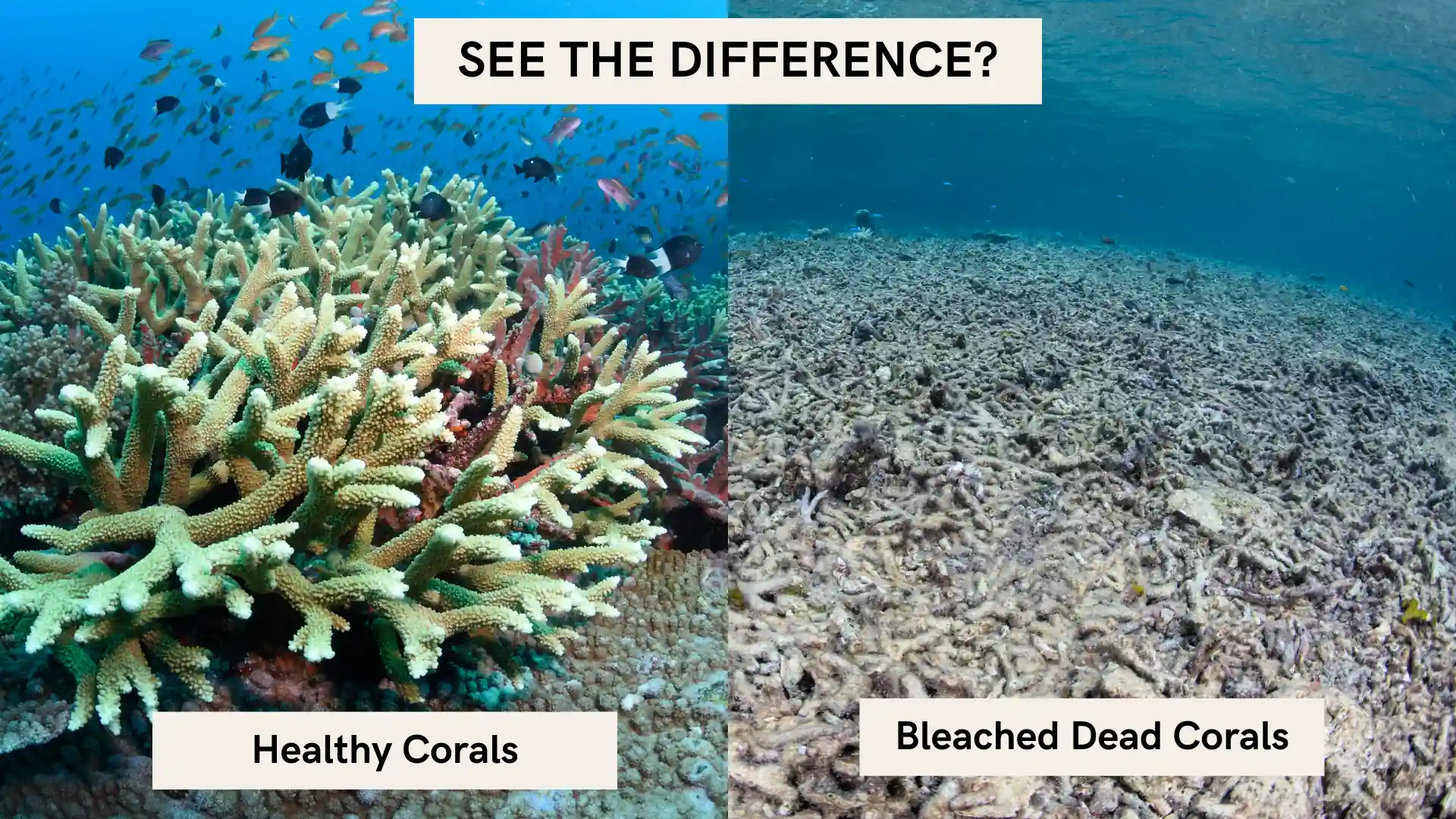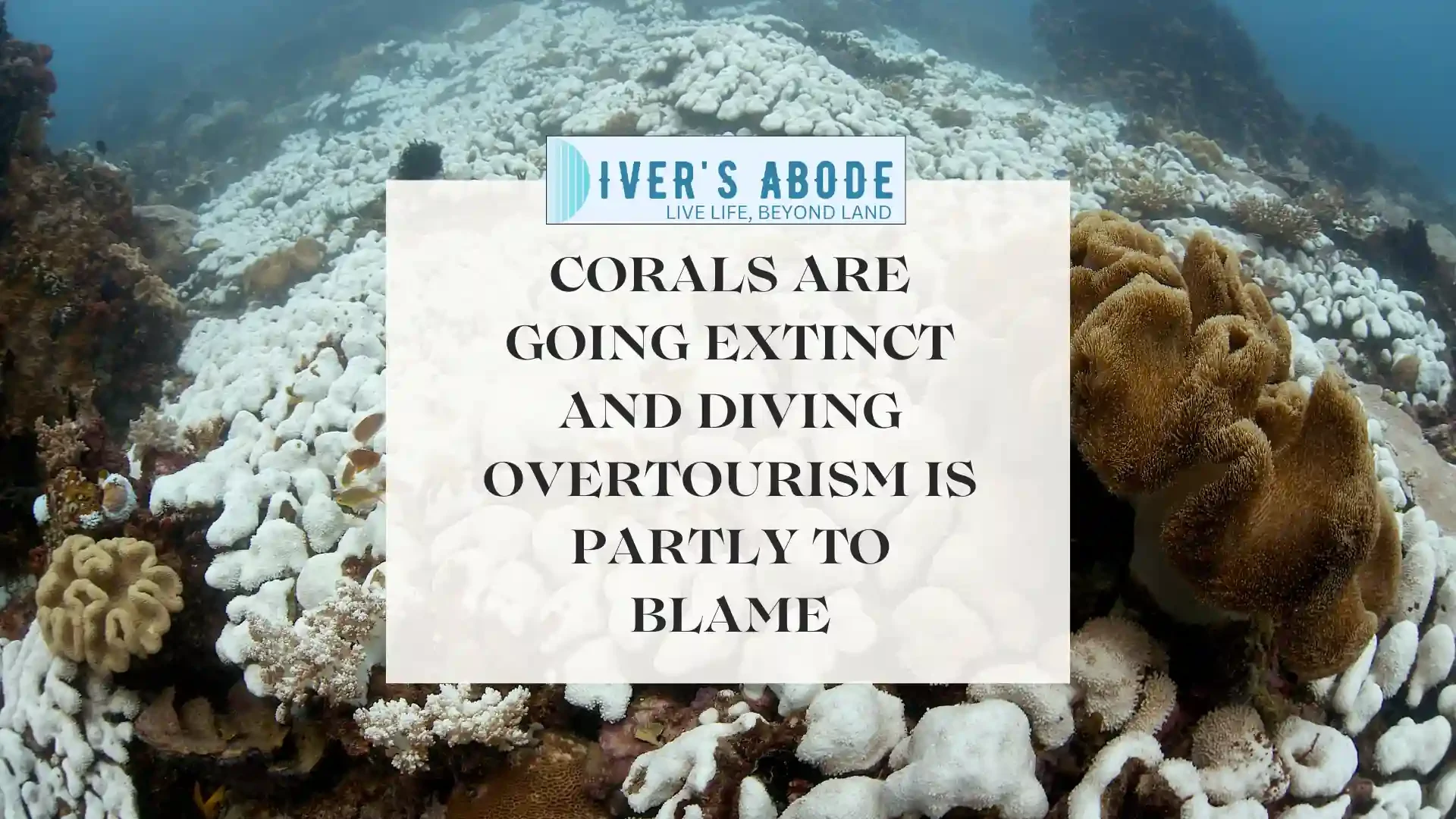I’ve been fortunate enough to go scuba diving in many dream locations around the world. But on a recent trip back to the remote dive site of Tubbataha Reef in Philippines, my jaw dropped for a different reason – bleached white coral as far as my eye could see. Then the gravity of the situation hit me like a train-wreck. If the coral ecosystem of such a remote location is affected to this extent what’s happening to the corals in the popular dive sites filled to the brim to divers and tourists?
The colorful, vibrant coral reefs that divers know and love are dying at an alarming rate. According to recent statistics, we’ve already lost 50% of the world’s coral reefs in just the past 3 decades alone!
Table of Contents
Some Ugly Statistics About Coral Death to Help You Wake Up to the Reality of the Situation

The rapid demise of coral reefs worldwide is an ecological crisis of unprecedented scale. Here are some sobering statistics that underscore just how grave the situation has become:
- Since 1957, approximately 50% of the world’s coral reefs have died. Scientists predict another 90% will be gone by 2050 if current trends continue.1
- In the Caribbean, coral cover has dropped by 80% in recent decades. Formerly spectacular reefs are now barren environments covered in algae.2
- New disease outbreaks are annihilating surviving coral colonies at alarming rates. A new disease in Florida wiped out 90% of staghorn corals3 along hundreds of miles of coastline within just 4 years.
- Mass coral bleaching events driven by warming oceans are killing huge swaths of reefs in a matter of weeks and months. The most recent global bleaching event from 2014-2017 killed an estimated 70-90% of all shallow water corals in certain regions.
I am a passionate scuba diver but even before I am a marine conservationist (as should all divers be), and these are devastating facts for me to comprehend. Coral reefs are some of the most biodiverse and beautiful ecosystems on the planet. Their loss will be catastrophic, not just for divers, but for the millions of marine plants and animals that depend on healthy coral reefs for survival.
The Diving Industry’s Greed Has a Major Role in Coral Reef Destruction
There are many complex factors, but one major culprit is the diving industry itself. The sad truth is that scuba diving and snorkeling tourism has boomed in popularity, leading to sheer overcrowding and overuse of coral reefs in many tropical destinations.
While many dive operators are eco-conscious, a few unethical actors driven by greed and short-term profits have wreaked havoc on coral reefs worldwide. Their destructive actions stem from prioritizing tourist volume over sustainability.
These profit-obsessed actors give the diving industry a terrible name through their reckless disregard for marine life.
Organizing Overcrowded Dive Trips to The Same Site Multiple Times a Day
Picture this scenario: On just a single dive trip, each diver may accidentally kick fragile corals with their fins multiple times. They brush up against the reefs, break off pieces of live coral, and stir up sand and debris that can smother and kill the corals.
Some operators pack as many divers onto boats and sites as possible, far exceeding ecologically sound limits. In places like the Great Barrier Reef, Thailand, and the Caribbean, it’s common for dive boats to visit the same reefs day after day, with dozens of divers entering the water up to four times per day. Their sole focus is maximizing daily dive tickets sold, with no concern for the long-term damage.
Dive Operators Are To Blame For Tourists Damaging Corals
Some divers show blatant disregard for reef health and break corals intentionally. As a divemaster, I’ve seen divers touch and take corals as souvenirs, as well as harass or try to feed reef sharks, rays, and turtles. The greedy operators lets all this slide just to guarantee their customers thrilling close encounters.
While this draws rave reviews and social media hype, it stresses the animals and alters their natural behaviors.
The Diving Crash Courses Are A Sham!
Many novice divers crash haphazardly into coral formations because they can’t control their weight or trim. Thrashing around to regain balance, they grab onto fragile branching corals, snapping them into pieces. Failing to hover carefully, they end up kneeling or sitting on reef structures. Multiply one rough diver by thousands and you can imagine the destruction.
Again the dive operators and agencies in the region are to blame. They offer poorly structured diving crash courses to absolute newbie tourists at exorbitant prices. End result? Hastily trained novices with pathetic essential diving skills like buoyancy control, trimming, horizontal streamlining, etc kicking and fumbling in the water for momentary thrill with complete disregard to the marine life around.
Agrresive Expansion of Dive Resort Chains
Certain dive focused resorts especially in Bali and Phillipines expand rapidly, developing coastlines and destroying local reefs and mangroves vital as fish nurseries. They dump untreated sewage directly onto adjacent reefs already fighting to survive.
And the sad part of it all? A lot of these dive resorts with unethical practices are run by our fellow American and European expats. We are people of the developed nations indeed!
What We, As Eco-Conscious Divers Can Do Before It’s Too Late
As divers who cherish coral reefs and rely on them for our sport, we need to be part of the solution.
1. Learn and Practice Impeccable Buoyancy Skills
A lot of scuba routines and skills are structured with ocean conservation in mind. So, before pointing fingers make sure you’re leaving no gaps in your efforts to not harm the corals by honing your diving skills. This one ability makes the biggest difference on an individual level.
Strive to hover perfectly with no unintended contact. Take the time to fine-tune your weighting and trim. Take a buoyancy control course if needed. Mastering neutral buoyancy helps the reef and improves your diving skills dramatically.
2. Choose Responsible Dive Operators
Patronize companies that care about reef conservation and limit the number of divers per site. Avoid operators that repeatedly visit the same fragile reefs day after day. Support eco-friendly dive resorts (most of the time they don’t go hand in hand) that nurture local reefs.
Always check the reviews before booking with cruise liners or dive resorts. Check in with the locals in advance. Trust me, the locals are more than happy to point out the bad actors destroying their surroundings.
3. Speak Up About Reef Abuse
Use your power as a tourist to speak up when you witness coral damage. Report it immediately to the dive operators and resort authorities so they can take action to prevent further harm. If they dont? Take their information and submit them to coral preseravation NGOs and diving communities to make other aware.
4. Continue Your Reef Education
Keep learning about reef conservation and share this knowledge with other divers. We protect what we love – the more you understand reef ecology, the more stewardship comes naturally.
Our Choices Matter More Than Ever
The survival of the world’s remaining coral reefs is in our hands now. As divers, we have a responsibility to change old habits and make choices that give coral reefs a fighting chance. If we want the joy of diving colorful reefs to continue for generations to come, we must act decisively to stop the damage before it’s too late. The time to protect the reefs is now.
